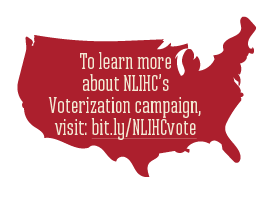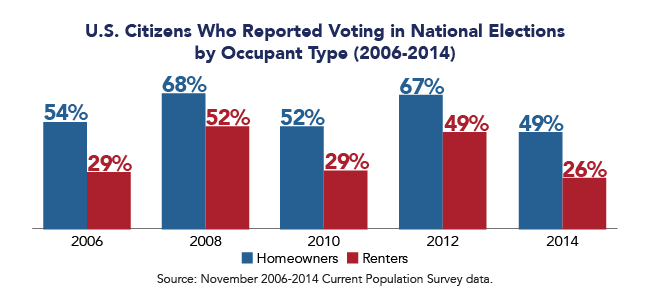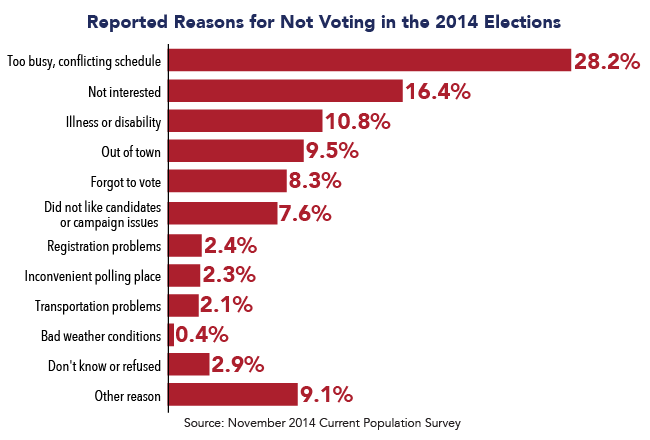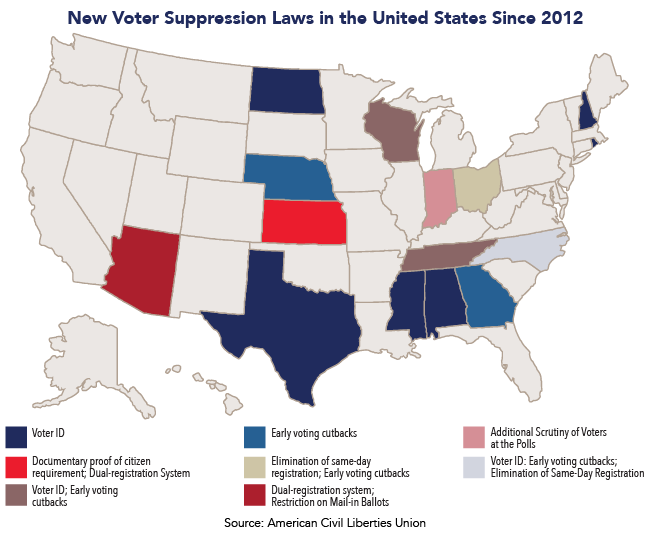Voterization 2016: An Overview
Sep 28, 2016
NLIHC works to elevate affordable rental housing as a top priority for policy makers by supporting the work of local organizations to increase voter registration, turnout, and education amongst low income renters and their allies.
- Educating Political Parties: NLIHC Informs Platform Committees
- Just the Facts (Graphics)
- Joining the Debate: Candidate Forums Bring Lasting Impact
- Educating Voters: Street Sense Distributes Candidate Positions on Housing Issues
- Questions to Ask on the Campaign Trail
- Affordable Housing on the Ballot: Portland Voters Will Decide on $258 Million in Funding
- Registering Voters: Minneapolis Establishes Renter-Voter Law
- Beware of New Voting Restrictions (Map)
Educating Political Parties: NLIHC Informs Platform Committees
Before each presidential election, the Democratic and Republican parties create “platform” documents outlining their policy priorities for the next four years. Both parties ask the public for comments and recommendations and consider this information, along with the opinions of the members of their party, as they create their platforms. This summer, NLIHC submitted comments on both parties’ platforms, urging party leaders to emphasize affordable housing for those with the greatest need as they crafted their priorities.
Former NLIHC President and CEO Sheila Crowley was invited by Senator Bernie Sanders to testify before the Democratic National Convention’s platform drafting committee. In her testimony, Dr. Crowley expressed the great need for additional housing affordable to those with the lowest incomes. She told the committee about the millions of American residents who must sacrifice basic necessities to pay rent and about the decline in federal spending for affordable housing programs. Dr. Crowley urged the committee to increase investment in the national Housing Trust Fund (HTF), to improve public housing and expand Housing Choice Vouchers, and to commit to ending homelessness. To read her full testimony, see www.bit.ly/CrowleyTestimony. NLIHC also submitted written testimony, again addressing the need for a shift in federal housing policy so that the greatest investment goes toward the greatest need. Read the full testimony at www.bit.ly/DNCtestimony.
The Republican National Convention (RNC) platform committee heard from NLIHC as well, through the Campaign for Housing and Community Development Funding (CHCDF), a broad coalition of housing groups managed by NLIHC. CHCDF carried the important message of increasing funding for housing programs. Advocates also told the platform committee about the high levels of lead in many public housing projects and encouraged them to invest in lead control in communities across the country. Read the full testimony at www.bit.ly/RNCtestimony.
Progress: The parties each released their platforms a few weeks before their conventions. The DNC platform commits to increase funding for the HTF and to “increase resources to repair public housing, and increase funding for the Housing Choice Voucher program.” These commitments represent a step forward for affordable housing advocacy. To read the full platform, see www.bit.ly/DNCplatform.
The RNC platform focuses on federal housing regulations and does not discuss increasing investments in rental housing. The platform criticizes federal fair housing and fair lending policies and calls for the federal government to scale back its involvement in the housing finance system. To read the full platform, see www.bit.ly/RNCplatform.
Joining the Debate: Candidate Forums Bring Lasting Impact
 Advocates in Nashville, Tennessee are taking action to raise awareness and support for affordable housing. Between 2010 and 2015, the Nashville metro area added an average of 30,875 people each year, a growth rate more than double the national rate in 2015. The production of housing has not kept up, driving up housing prices and tightening the rental market. Extremely low income renters, those with incomes at or below 30% of the area median income (AMI), have suffered the most. Recognizing the growing crisis, advocates used the city’s 2015 mayoral election to raise support for investments in affordable housing. Advocacy organizations, led by Nashville Organized for Action and Hope, hosted a candidate forum for the city’s seven mayoral candidates that drew over 1500 people and used the event to discuss affordable housing and proposed policy solutions.
Advocates in Nashville, Tennessee are taking action to raise awareness and support for affordable housing. Between 2010 and 2015, the Nashville metro area added an average of 30,875 people each year, a growth rate more than double the national rate in 2015. The production of housing has not kept up, driving up housing prices and tightening the rental market. Extremely low income renters, those with incomes at or below 30% of the area median income (AMI), have suffered the most. Recognizing the growing crisis, advocates used the city’s 2015 mayoral election to raise support for investments in affordable housing. Advocacy organizations, led by Nashville Organized for Action and Hope, hosted a candidate forum for the city’s seven mayoral candidates that drew over 1500 people and used the event to discuss affordable housing and proposed policy solutions.
Nashville Organized for Action and Hope (NOAH) is a grassroots advocacy group of 60 religious congregations, labor unions, and community groups representing over 10,000 Nashvillians. In the months leading up to last year’s mayoral election, NOAH leaders met with each of the seven candidates, introducing their organization and asking if the candidates would be willing to work with NOAH members. They specifically asked that the candidates commit to meeting with the group four times a year, should they be elected. Following those commitments, NOAH invited the candidates to their public forum called “A Tale of Two Nashvilles” where candidates could share their plans to increase equity in the city and have a chance to learn more about social injustices.
At the forum, NOAH discussed their key policy issues: affordable housing, criminal justice, and economic equity. Group leaders explained the challenges facing their city and recommended policies to counter these challenges, including increased investment in the city’s affordable housing trust fund, an end to racially biased police practices, and a commitment to hire Nashville residents for public construction projects. Following the policy analysis and reports by group members, NOAH asked the candidates to endorse their platform and priorities. In front of the crowded room of NOAH members, each candidate agreed to work toward fairness in housing, criminal justice, and employment and to work closely with NOAH. Then each candidate had two minutes to discuss his or her own policy priorities. This structure allowed NOAH to educate the candidates, the audience, and the media about key justice issues and to secure the support of whomever won the election. Key Nashville media outlets covered the event, and the city paper published multiple stories about NOAH, the forum, and the candidates’ stances on the issues NOAH had raised. Through the forum and the media attention it gathered, along with additional work NOAH and other Nashville advocacy groups did, affordable housing became “a central campaign issue, if not the central campaign issue” of the 2015 mayor election, according to Bill Friskics-Warren, co-chair of NOAH’s affordable housing task force.
NOAH, along with other affordable housing advocacy groups in Nashville, built on the success of their forum to raise awareness for the housing crisis. After the election of Mayor Megan Berry who endorsed NOAH’s platform, advocates have continued to push for investment in homes affordable to low income Nashvillians. Thanks in large part to this advocacy, Mayor Berry has made affordable housing a cornerstone of her administration. In 2016, she committed $10 million for the city’s affordable housing trust fund, the first commitment of its size in Nashville’s history. Still, the members of NOAH are committed to continuing the fight for increased investment in affordable housing through grassroots organizing and advocacy.
Educating Voters: Street Sense Distributes Candidate Positions on Housing Issues
As the November elections approach, housing advocates have an opportunity to educate voters about critical policy issues related to housing and homelessness by creating a voter guide. Voter guides often include candidate responses to questionnaires explaining candidates’ policy positions on a variety of topics. For the June 2016 primary election, the editorial board of Street Sense used their paper as a platform to inform voters about candidates’ views on affordable housing. Street Sense is a Washington, DC-based street newspaper focused on the needs of homeless populations.
Before each local election in DC, Street Sense publishes a voter guide to help residents better understand where candidates stand on affordable housing issues, including the preservation of public housing, the creation of new affordable housing, and the city’s approach to homelessness. Street Sense Editor-in-Chief Eric Falquero told NLIHC, “we see it as a responsibility to our readers and to the community to make sure those issues are discussed going into the election.” To do this, Falquero and his team created the 2016 guide, which served to remind both candidates and voters of the importance of local housing policy in DC.
In order to publish the guide, the Street Sense team had to first create, distribute, and solicit responses to their candidate questionnaire. The Street Sense team posed five questions to each candidate in the DC primary election. One question was, “The availability of affordable housing in the District has been nearly cut in half since 2002. Low and moderate-income residents must spend high percentages of their income on rent. What specific steps would you take to make the city affordable for all of its people?” These questions informed candidates about the issues facing low and moderate income renters while also asking candidates to make policy commitments, two elements of a successful candidate questionnaire.
The questionnaire asked candidates to submit short responses one week after receiving the questions and informed them where their answers would be published. After gathering the responses, the Street Sense team compiled the candidates’ answers, which included commitments to fight for additional affordable housing resources, into a lengthy article for their newspaper.
The Street Sense voter guide empowered these readers to help elect officials who will commit to expanding affordable housing for all DC residents.
To view the entire Street Sense voter guide, see: www.bit.ly/voterguidedc
To learn more about how you can create a voter guide in your community, see: www.bit.ly/NPVVoterGuide
3 Questions to Ask on the Campaign Trail
Before you cast your vote on November 8, know where the candidates stand on affordable housing issues. Here are three questions to ask candidates:
- What generally should be the role of government in addressing housing affordability issues, and what steps would you take to encourage the production of more affordable homes for families who are cost-burdened—those paying more than 30 percent of their income on housing costs?
- What specifically will you do to expand access to housing assistance to every household that needs it?
- What will you do to end homelessness?
Affordable Housing on the Ballot: Portland Voters Will Decide on $258 Million in Funding
This fall, housing advocates in Portland, Oregon are preparing for a monumental vote in support of affordable housing. Portland officials have recognized the housing crisis that the city faces and have proposed a $258.4 million property tax measure (Measure 26-179) that will build and preserve 1,300 affordable rental homes for low-income households. The plan proposes to increase tax rates by 42 cents per $1,000 of assessed property value. Portland nonprofits and developers would use the $258 million bonds to construct and rehabilitate affordable rental housing. An oversight committee would be established to ensure that construction and property acquisition serve low income households.
Portland declared a state of emergency on homelessness in October 2015, a crisis with more than 4,000 individuals homeless in shelters or on the street on any given night. To achieve long-term solutions, nonprofits have increased their involvement in legislative advocacy and campaigns. The Welcome Home Coalition is a group of 143 organizations in the Portland area collaborating on policy changes to address affordable housing. To support Measure 26-179, the Welcome Home Coalition has launched the “Yes for Affordable Homes” campaign.
All of the 1,300 affordable homes built or preserved through Measure 26-179 must be affordable to low income households with incomes at 60% of area median income (AMI), and nearly half of the new housing—600 rental homes—will be affordable to extremely low income households living at only 30% of AMI. All affordable housing built or preserved through Measure 26-179 funding must be permanently affordable. The type and size of new affordable housing built will be flexible and reviewed by the oversight committee. One expected use of Measure 26-179 funds will be to acquire properties and preserve rent levels of currently affordable housing in neighborhoods that are experiencing gentrification that is displacing low income residents.
Yes for Affordable Homes is working hard to mobilize voters to submit their ballots as early as possible. All registered Oregon voters receive ballots in the mail and then either submit their ballots at drop box locations or through the postal service. The widespread vote-by-mail approach is why Oregon consistently has some of the highest voter turnout rates in the country.
For more information, visit www.yesforaffordablehomes.com.
Registering Voters: Minneapolis Establishes Renter-Voter Law
Renters head to the polls at much lower rates than homeowners every Election Day. One reason this occurs is that renters move more often to new cities or new apartments and then need to update their registrations. The Minneapolis City Council has taken action to address the voter turnout disparity. Effective March 1, 2016, landlords in Minneapolis are required to provide voter registration information to all new residents over the age of 18. The Tenant Notification of Voter Registration ordinance allows for landlords to email or hand deliver the voter registration packets, which come in English, Somali, Hmong, and Spanish.
There are varying estimates of how much the renter-voter law will actually increase registration and turnout, but more than half of all Minneapolis residents are renters, so the potential change is significant. Implementing the new policy is fairly simple in Minneapolis because landlords are required to be officially licensed by the city.
Other cities have tried to enact renter-voter provisions before. Madison, Wisconsin passed a similar ordinance in 2012, but the state legislature swiftly passed a preemption law banning cities from having these policies. Westminster, Colorado proposed a similar initiative that failed largely due to opposition based on fines that would be levied on landlords who did not participate.
To learn more about the Tenant Notification of Voter Registration ordinance, visit http://vote.minneapolismn.gov/resources/TNVR.


